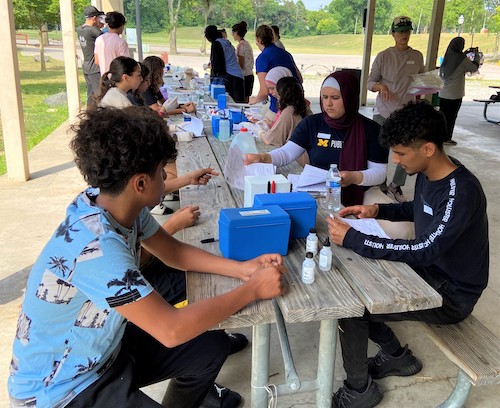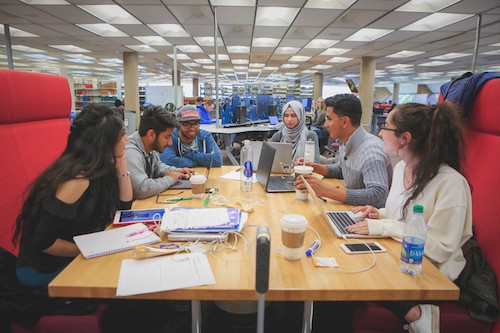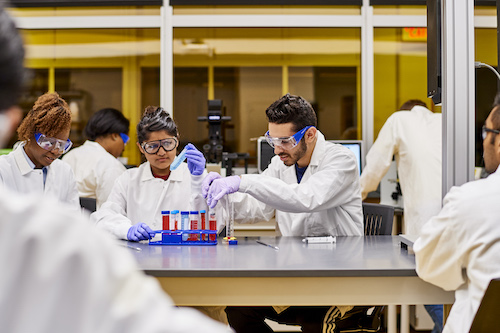PBL in Health and Human Services
"PBL sets learners up to engage with real-world problems, recognize our community's assets, and tackle issues beyond the classroom, as well as participate in authentic learning experiences that require applied knowledge, critical thinking, and decision-making (Biello et al, 2020)."
This approach is particularly well-suited for our curricula, as we seek to prepare students for a dynamic, interdisciplinary, professional environment.
In Health and Human Services
We use a scaffolded approach to our curriculum that allows students to build the skills necessary to be successful in PBL learning.
Foundational Courses
 Students acquire problem-solving and decision-making skills through course assignments, including reflective learning. Projects are often scaffolded, throughout the semester and largely individual efforts (not teams-based).
Students acquire problem-solving and decision-making skills through course assignments, including reflective learning. Projects are often scaffolded, throughout the semester and largely individual efforts (not teams-based).
HHS 100 - Personal Health and Wellness
HHS 200 - Introduction to Public Health
HHS 210 - Introduction to Social Work
HHS 306 - Program Plan Implementation
HHS 401 - Methods of Health Promotion
HHS 404/504 - Financing Health and Medical System
Teamwork Courses
 Students work on projects where they have the opportunity to work with classmates, applying teams-approaches to authentic problem-solving that require critical thinking, communication, applied knowledge, decision-making and reflection in classroom experiences.
Students work on projects where they have the opportunity to work with classmates, applying teams-approaches to authentic problem-solving that require critical thinking, communication, applied knowledge, decision-making and reflection in classroom experiences.
HHS 250 - Introduction to Environmental Health
HHS 308 - Introduction to Macro Social Work
HHS 311 - Work with Vulnerable Populations
Community Engaged Course
In advanced classes, we typically partner with community organizations on projects that allow students to critically engage with real-world problems.
HHS 350 - Community Organizing for Health
In HHS 350: Community Organizing for Health, students, faculty, and community partners collaborate in a service-learning experience. While learning about theories and practice of community organizing, students engage in a mutually beneficial real-world project. Through this project, they apply new skills and knowledge, and they build capacity in local efforts towards health equity. Past projects have entailed development of infographics, grant proposals, policy briefs, resource guides, discussion guides, social media plans, campaign materials to promote a local ordinance, and various school and neighborhood greening events, for instance.
HHS 406/506 - Program Evaluation
Students work in teams with community partners to develop a program including a plan to implementation & evaluation. In doing so, they complete a semester-long scaffolded project that includes:
- A mini community needs assessment
- A program logic model
- A program proposal (formatting determined by what is most useful for community partner)
- A program evaluation plan
Internships
Our internship program offers students real-world experiences to problem-solve and even greater autonomy, while still providing a classroom space for self-reflections and meaning-making of the experience with an instructor.
Interprofessional Education
 HHS is committed to providing our graduates with the skills and competencies needed to be successful in today’s complex healthcare environments as future health professionals. Whichever field our graduates choose to work in, all of our learners need the ability to work in interdisciplinary collaborative teams. Part of our commitment comes in the form of our participation with the Center for Interprofessional Education and our approach to a core set of undergraduate classes that all HHS tracks need to complete. This interdisciplinary approach assures that all students have exposure to and understanding of multiple disciplinary lenses and fields before they specialize in a single field. This provides our students with the advantage of knowing how to work in diverse teams to respond to and solve today’s health by demonstrating skills including shared decision making, joint accountability for patient care, and an understanding of population health, all of which are fundamental to addressing today’s health and human service challenges.
HHS is committed to providing our graduates with the skills and competencies needed to be successful in today’s complex healthcare environments as future health professionals. Whichever field our graduates choose to work in, all of our learners need the ability to work in interdisciplinary collaborative teams. Part of our commitment comes in the form of our participation with the Center for Interprofessional Education and our approach to a core set of undergraduate classes that all HHS tracks need to complete. This interdisciplinary approach assures that all students have exposure to and understanding of multiple disciplinary lenses and fields before they specialize in a single field. This provides our students with the advantage of knowing how to work in diverse teams to respond to and solve today’s health by demonstrating skills including shared decision making, joint accountability for patient care, and an understanding of population health, all of which are fundamental to addressing today’s health and human service challenges.
Induction to IPE Module
The Introduction to IPE Module introduces students to the current healthcare landscape through the perspectives of patients and families as well as faculty. It then provides an overview of the history of interprofessional education and how it relates to the quadruple aim of health care: improved patient experience, improved population health, increased workforce satisfaction, and reduced cost of health care. The content is appropriate for students across the health science schools and is ideal for learners early in their programs. This module has been embedded into several HHS courses.
Longitudinal Interprofessional Family-Based Experience (LIFE)
Co-Curricular Activity:
LIFE connects teams of interprofessional students (who have applied for admission) with patients who have a chronic illness. Students participating in this experience will be immersed in IPE competencies as they learn about the social determinants of health that impact the patient/family’s interface with the health care system and community. Students must have completed the Introduction to IPE online course in order to participate.
The System of Care approach was developed out of a need for more effective strategies for treating children, adolescents, and their families who were at risk for mental health disorders. The approach aims to provide community-based, integrated individual care while engaging the whole family system through a strength-based, culturally humble perspective.
Within the course, students receive the opportunity to become fully immersed in an interdisciplinary and collaborative team process. The purpose of this is to parallel the types of collective group work that takes place within various systems of care. Students are placed into interprofessional teams based on their projected healthcare careers. For example, a simulated team may consist of a: General practitioner, physician’s assistant, counselor, and physical therapist. As a team they may be tasked with treating those with chronic conditions and present solutions informed by their field’s expertise. The fully integrated system of care experience runs for approximately 8 weeks.
Student Examples of PBL in HHS
Photovoice Project: Mentally III, Working College Students
Photovoice Project: Picture Compilation
Contact Information
CEHHS Office for Student Success
262 (2nd Floor) Fairlane Center South (FCS)
19000 Hubbard Drive Dearborn, MI 48126
cehhs-oss@umich.edu
313-593-5090
